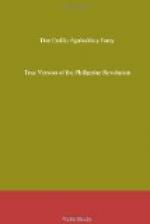It is therefore evident that Artacho, in making this preposterous demand, was acting as a spy for the enemy, as an agent of General Primo de Rivera, for he wanted to extinguish the rebellion by depriving its organizers and leaders of the most indispensable element, the “sinews of war,” which is money. This was the view, too, of the whole of my colleagues, and it was resolved by us that I should leave Hongkong immediately and thereby avoid the litigation which Artacho seemed bent upon and thereby afford my companions time and opportunity to remove this new and wholly unexpected barrier to the realization of our cherished plans for the emancipation of our beloved fatherland. I am profoundly pleased to say that they succeeded, Artacho withdrawing the suit through a transaction.
In accordance with the decision of the meeting above referred to, I left Hongkong quietly on the 7th April, 1898, on board the steamship Taisany, and after calling at Saigon I reached Singapore as a passenger by the s.s. Eridan, landing there as secretly as possible on the 21st April. I at once proceeded to the residence of one of my countrymen.
Thus is explained the cause of the interruption of the vitally important negotiations with Admiral Dewey, initiated by the Commander of the Petrel.
But “Man proposes and God disposes” is a proverb which was verified in its fullest sense on this occasion, for, notwithstanding the precautions taken in my journey to avoid identification yet at 4 o’clock in the afternoon of the day I arrived at Singapore an Englishman came to the house in which I was residing and in a cautious manner stated that the United States Consul at that port, Mr. Spencer Pratt, wished to have an interview with Don Emilio Aguinaldo. The visitor was told that in that house they did not know Aguinaldo; this being the prearranged answer for any callers.
But the Englishman returned to the house several times and persisted in saying that it was no use trying to conceal the fact of Aguinaldo’s arrival for Consul Pratt had received notice from Admiral Dewey of General Aguinaldo’s journey to Singapore.
In reply, the Consul said he would telegraph about this matter to Admiral Dewey, who was, he said, Commander-in-Chief of the squadron which would invade the Philippines, and who had, he also stated, full powers conferred on him by President McKinley.
Between 10 or 12 in the forenoon of the next day the conference was renewed and Mr. Pratt then informed me that the Admiral had sent him a telegram in reply to the wish I had expressed for an agreement in writing. He said the Admiral’s reply was—That the United States would at least recognize the Independence of the Philippines under the protection of the United States Navy. The Consul added that there was no necessity for entering into a formal written agreement because the word of the Admiral and of the United States Consul were in fact equivalent to the most solemn pledge that their verbal promises and assurance would be fulfilled to the letter and were not to be classed with Spanish promises or Spanish ideas of a man’s word of honour. In conclusion the Consul said, “The Government of North America, is a very honest, just, and powerful government.”




